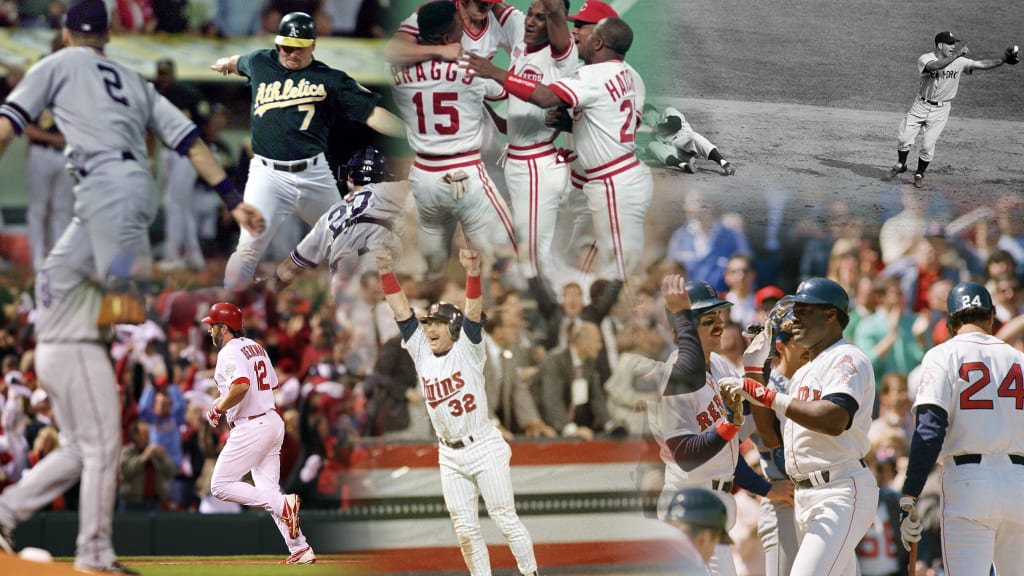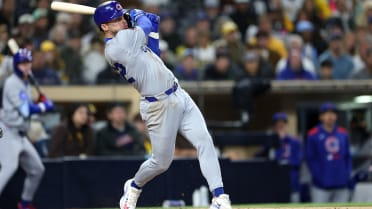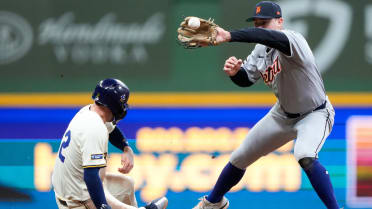
Pressure. It seems to apply to every pitch come October, setting the Major League postseason apart from playoffs in any other sport. History shows that any play, no matter how small it seems in the moment, can wind up changing everything.
That pressure can grind certain moments into diamonds, and we all have a collection we’re familiar with: Bill Mazeroski in 1960, Carlton Fisk in ‘75, Joe Carter in ‘93, Luis Gonzalez in 2001, etc. But don't sleep on the plays that preceded those timeless highlights. The ones that changed the air in the stadium. The ones that made the clubhouse attendants think twice about putting the champagne on ice. The ones that made a team start to believe. The ones no one saw coming.
The most obvious example from recent times? That’s probably Kevin Millar’s walk and Dave Roberts’ pinch-run steal from the 2004 American League Championship Series, now an iconic moment in Boston lore. Call plays like that momentum-swingers, game-extenders, rally-starters or, in the opinions of some, acts of God. We’ll call them “table-setters” here -- AkA the plays that opened the door for history. Here, in reverse chronological order, are a collection of the best of those table-setters.
Lorenzo Cain’s ninth-inning leadoff walk
Date: Nov. 1, 2015 (World Series Game 5)
Matt Harvey had trotted back out to the pitcher’s mound, and Queens was going wild. A packed house chanted Harvey’s name as he jumped out to a 1-2 count on Cain to lead off the ninth, mere outs away from etching his name into New York City lore.
But those 2015 Royals refused to be denied. Cain laid off high heat, fouled off strikes and watched a tantalizing Harvey changeup drop for ball four. Cain then stole second on the very next pitch, Mets manager Terry Collins kept Harvey in to pitch out of the stretch and Eric Hosmer doubled Cain home. In the span of three pitches, the momentum had completely flipped.
Berkman ties it -- again -- in Game 6
Date: Oct. 27, 2011 (World Series Game 6)
This will always be the David Freese Game after Freese's two-run triple tied it with the Cardinals down to their final strike in the ninth. St. Louis then won it in the bottom of the 11th. But never sleep on the 10th inning of this all-time classic, when Berkman -- after Josh Hamiltion put Texas back on top with a two-run homer in the top half -- tied it back up with a two-out, two-strike RBI single off Scott Feldman. Freese doesn’t get to play hero if Berkman, just like Freese, didn’t pull the Redbirds back from the jaws of defeat.
Eckstein starts a rally against Lidge
Date: Oct. 17, 2005 (NLCS Game 5)
Astros closer Brad Lidge hadn't given up a run in 23 consecutive games (regular and postseason) against St. Louis dating back to September 2003 before the Cardinals scratched one against him in Game 3 of this series -- which the Astros won anyway. In those 23 games, the Redbirds had mustered just six hits against Lidge.
So when shortstop David Eckstein saved the Cardinals’ season with a two-out, two-strike single in the top of the ninth of Game 5, it felt like more than just a stray base hit. It brought up the big bats, as Jim Edmonds walked and Albert Pujols walloped one of the most soul-crushing dingers in history to stun the Houston crowd.
Mo’s error in Game 7
Date: Nov. 4, 2001 (World Series Game 7)
Mariano Rivera had converted 23 straight postseason save opportunities entering this night, and so when Alfonso Soriano homered off Curt Schilling to put the Yankees on top in the eighth, just about everyone assumed New York was about to celebrate its fourth straight World Series title. Even when Mark Grace singled to lead off the ninth, Rivera had wriggled out of so many jams before.
But when Damian Miller bunted in the next at-bat, Rivera, one of the best fielding pitchers of his day, charged the ball and threw wide of second base. With Miller, a catcher, running down the line, there was at least a chance of a bases-clearing double play -- especially given how quickly Rivera got to the ball. Instead, everyone was safe, Tony Womack doubled in the tying run and Luis Gonzalez chipped his famous flare over the head of Derek Jeter. Rivera suggested postgame that things might have gone differently if he had made this throw.
Giambi stays in the game
Date: Oct. 13, 2001 (ALDS Game 3)
The A’s were up two-games-to-none in the best-of-five ALDS but trailed 1-0 in the seventh, when Jeremy Giambi knocked a two-out single off Mike Mussina. Oakland manager Art Howe could have pinch-run Eric Byrnes for Giambi as the potential tying run, but opted instead to let the slower Giambi run the bases.
That turned out to be a problem. When explaining his iconic “flip” play during his Hall of Fame election news conference, Jeter admitted that part of his thought process was that with Giambi running, he knew he might have a chance at the plate. As with most things Jeter, fate was on his side. Giambi was called out, and the Yankees turned around the series.
Shawon Dunston refuses to go down
Date: Oct. 17, 1999 (NLCS Game 5)
Robin Ventura’s 15th-inning “Grand Slam Single” is commemorated outside Citi Field and revered among Mets fans. But the bases aren’t loaded for Todd Pratt’s walk and Ventura’s dramatic drive without Dunston’s marathon at-bat. Leading off the frame against Braves reliever Kevin McGlinchy, Dunston dug in for 12 pitches over the course of nine minutes, fouling off six pitches after the count reached 3-2 before finally singling up the middle. Dunston’s grit certainly took pitches off McGlinchy’s odometer before Ventura came up.
Rickey’s walk and speed threat
Date: Oct. 23, 1993 (World Series Game 6)
Joe Carter “touched ‘em all” to famously win the 1993 World Series for Toronto. But he would have never homered off Phillies closer Mitch Williams if Rickey Henderson wasn’t distracting Williams from second base. At least, that’s what Henderson claims.
Baseball’s all-time leadoff man did his thing by drawing a walk on four pitches to start the bottom of the ninth. Then, Paul Molitor singled to put Henderson on second. Williams later revealed that Henderson’s presence made him try out a slide step for the first time in his career, and indeed it was a slide-step-gone-wrong that caused Williams to miss his location on a fastball down and in to Carter. Rickey might be right.
Dan Gladden’s hustle double
Date: Oct. 27, 1991 (World Series Game 7)
Perhaps the Twins’ Series-winning rally in the bottom of the 10th gets less fanfare than the John Smoltz-Jack Morris pitchers' duel that took place on the mound. So too does Chuck Knoblauch’s ingenious deke play that froze Lonnie Smith and saved a run in the top of the eighth. But Gladden deserves equal mention.
Gladden fought off Alejandro Pena for what looked to be a broken-bat single into shallow center. But Gladden, plenty familiar with how the ball bounced high off the Metrodome turf, never broke stride and slid into second with a breathtaking double. Knoblauch bunted Gladden over to third and Pena intentionally walked Kirby Puckett and Kent Hrbek to load the bases. Pinch-hitter Gene Larkin drove one over the Braves’ drawn-in outfielders, and the Twins were champions.
Billy Bates gets on vs. Eckersley
Date: Oct. 17, 1990 (World Series Game 2)
Bates’ Baseball-Reference page lists just six career Major League hits for the 5-foot-7, 155-pound second baseman. But if you scroll over to Bates’ postseason game log, you’ll find one more base hit -- and one of the more unlikely ones in recent history. With Game 2 tied at 4 in the bottom of the 10th, Reds manager Lou Pinella summoned Bates to pinch-hit. The task? Start a rally against A’s closer Dennis Eckersley, who was only coming off one of the best seasons (0.61 ERA, 48 saves) by any reliever ever.
Bates only had time for a couple practice swings. His only experience against Eckersley was watching him on TV. But he did his job, laying down an old-style Baltimore chop grounder that went off third baseman Carney Lansford’s glove for an infield single. Joe Oliver drove in Bates for the game-winning run, spurring the Reds to their upset sweep over the mighty A’s.
Mike Davis extends the inning
Date: Oct. 15, 1988 (World Series Game 1)
Yes, this involves Eckersley again; just like Rivera, his greatness is amplified by the very few times he failed. Eck got two quick outs to start the bottom of the ninth at Dodger Stadium, and by now many of you already know that Kirk Gibson was about to hobble out of the dugout. But before he did, it was Davis -- suffering through a miserable first year (.196 average) in Los Angeles -- who worked a five-pitch walk to keep the inning alive.
Davis and Eckersley were teammates on the A’s, and there’s some thought that Eck, still remembering Davis’ power of yesteryear, pitched him carefully. The light-hitting Dave Anderson -- not Gibson -- was standing in the on-deck circle, giving Eckersley further incentive to pitch around Davis. Of course, Anderson was not the next man to dig in at the plate. Instead, it was Gibson, and we all remember what happened next. Eckersley appeared in 22 more postseason games, and never issued another walk.
Stanley’s wild pitch
Date: Oct. 25, 1986 (World Series Game 6)
Bill Buckner became the goat when Mookie Wilson’s "little roller" went through his legs, but the Mets did plenty of work to tie the game before Buckner got involved. With New York down to its final out of the season, Red Sox reliever Calvin Schiraldi -- pitching in his third inning of relief -- allowed three straight hits. Right-hander Bob Stanley replaced Schiraldi with a one-run lead and locked into a battle with Wilson, running the count to 2-2 before Wilson fouled off another two pitches. Finally, with the Red Sox one strike away from their first title since 1918, Stanley blinked, hurling a pitch way inside and to the backstop to bring Kevin Mitchell home for the tying run. Wilson's roller soon followed.
Don Baylor cuts deficit in Anaheim
Date: Oct. 12, 1986 (ALCS Game 5)
The Red Sox needed heroics of their own just to reach the 1986 World Series, of course, and Dave Henderson -- who hit both the go-ahead homer in Game 6 of the ‘86 World Series and the game-tying homer and winning sac fly in this Game 5 of the ALCS -- was oh-so-close to being known among the all-time postseason heroes, if the Sox had held on in Queens.
But things were even more dire for Boston before Henderson came up in the ninth. The Angels led the Sox, 5-2, and were just two outs away from their first World Series appearance when Baylor reached out and pulled a 3-2 pitch from Mike Witt just over the glove of center fielder Gary Pettis for a two-run homer. That brought Boston to within a run, and set the stage for Henderson.
Carbo sets the stage for Fisk
Date: Oct. 21, 1975 (World Series Game 6)
Many recall this October night at Fenway Park as one of the greatest games in history, and it’s for way more than Carlton Fisk’s wave-it-fair game-winner. Red Sox Nation will quickly tell you that outfielder Bernie Carbo was a hero, too, for what he did after coming off the bench with two outs in the bottom of the eighth inning to pinch-hit for pitcher Roger Moret. Boston trailed, 6-3, and every one of Carbo's swings against Reds pitcher Rawly Eastwick was way late -- except the last one. The former Cincinnati star lofted a two-strike pitch over the center-field wall, tying the game at 6. It would stay tied all the way until the bottom of the 12th, when Fisk became an October legend.
Virdon’s grounder takes a wild hop
Date: Oct. 13, 1960 (World Series Game 7)
Despite wildly outscoring the Pirates in Games 1 through 6, the mighty Yankees still found themselves in a winner-take-all Game 7 on the road and trailed early, 4-0, to the underdog Pirates. But the pinstripes erased that deficit by the sixth inning, when Mickey Mantle and Yogi Berra drove in a combined four runs in back-to-back at-bats to put New York up 5-4.
The Yankees' lead was up to three runs when Pirates pinch-hitter Gino Cimoli singled to lead off the bottom of the eighth. The next batter, Bill Virdon, hit a potential double-play grounder to Yankees shortstop Tony Kubek, but the ball took a bad hop and struck Kubek in the throat. Kubek had to leave the game and the rally was extended for the Pirates, who plated a pair of runs before Hal Smith’s clutch three-run homer improbably put Pittsburgh back up, 9-7. Bill Mazeroski’s walk-off homer in the next inning can be found on every postseason highlight reel, but this was looking like another inevitable Yankees escape before Virdon’s hop turned the tide.
Mueller, Lockman chase Newcombe
Date: Oct. 3, 1951
Bobby Thomson’s three-run homer will always be the “Shot Heard ‘Round the World,” but the Giants had to score a run before that to make his blast a walk-off. Dodgers ace Don Newcombe cruised into the bottom of the ninth with a 4-1 lead, and still looked safe when Alvin Dark led off with a single. But trouble started brewing in the next at-bat, when Don Mueller knocked a ground-ball single past Dodgers first baseman Gil Hodges.
Hodges would have been better positioned to field Mueller’s grounder if Dodgers manager Chuck Dressen hadn’t instructed him to hold the runner Dark at first. Two batters later, Whitey Lockman doubled to drive in Dark and chase Newcombe from the game. Then, Thomson clubbed his pennant winner off reliever Ralph Branca.
Matt Kelly is a reporter for MLB.com based in New York.




